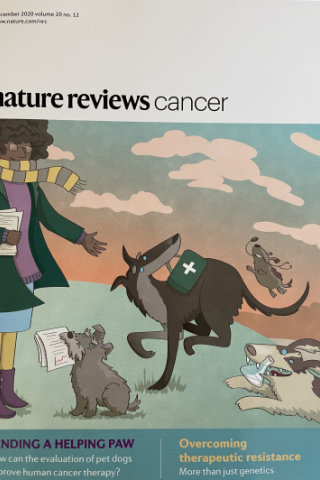Amy K. LeBlanc, D.V.M.
- Center for Cancer Research
- National Cancer Institute
- Building 10, Room 1B53
- Bethesda, MD 20892
- 240-760-7093
- amy.leblanc@nih.gov
RESEARCH SUMMARY
As Director of the Comparative Oncology Program, Dr. LeBlanc has a strong interest in animal modeling for development of new cancer drugs and imaging agents, and identification of imaging biomarkers, development and optimization of PET imaging hardware and imaging protocols.
Areas of Expertise
Comparative Oncology Program
A multidisciplinary research network dedicated to the study of naturally occurring cancers in animals as a model for human disease.
Amy K. LeBlanc, D.V.M.
Research
Dr. LeBlanc has a strong interest in animal modeling for development of new cancer drugs and imaging agents, and identification of imaging biomarkers, development and optimization of PET imaging hardware and imaging protocols. She has experience in fostering collaborations with industry and academic partners to support relevant eIND studies in man. She has given numerous invited lectures on the inclusion of companion animals in imaging-based translational research and the value of comparative oncology in drug and imaging agent development.
Publications
- Bibliography Link
- View Dr. LeBlanc's PubMed Summary
Biography
Amy K. LeBlanc, D.V.M.
Dr. Amy LeBlanc is a board-certified veterinary oncologist, Senior Scientist and Director of the CCR Comparative Oncology Program at the National Cancer Institute, NIH. In this position, she directly oversees and manages the operations of the Comparative Oncology Trials Consortium (COTC), which designs and executes clinical trials of new cancer therapies in tumor-bearing pet dogs.
Dr. LeBlanc is a graduate of Michigan State University, holding both B.S. and D.V.M. degrees. She completed a rotating internship in small animal medicine and surgery at Texas A&M University and a residency in companion animal oncology at Louisiana State University. She is board-certified by the American College of Veterinary Internal Medicine.
Prior to her appointment at NIH, Dr. LeBlanc was an Associate Professor with tenure and Director of Translational Research at the University of Tennessee College of Veterinary Medicine (CVM) and UT Graduate School of Medicine (GSM). Dr. LeBlanc’s group at the University of Tennessee published the first comprehensive studies describing molecular imaging of dogs and cats using PET/CT, focusing on the forward and back-translation of 18F-labelled radiopharmaceuticals.
Dr. LeBlanc has given numerous invited lectures on the inclusion of companion animals in imaging-based translational research and the value of comparative oncology in drug and imaging agent development.Her program also provides support to several extramural NCI-funded initiatives including the Integrated Canine Data Commons and Cancer Moonshot-funded canine immunotherapeutic clinical trials conducted under the PRECINCT network.
Job Vacancies
We have no open positions in our group at this time, please check back later.
To see all available positions at CCR, take a look at our Careers page. You can also subscribe to receive CCR's latest job and training opportunities in your inbox.
Team
News
Covers

Lending A Helping Paw: Improving human cancer therapy through the evaluation of pet dogs
Abstract
Comparative oncology clinical trials play an important and growing role in cancer research and drug development efforts. These trials, typically conducted in companion (pet) dogs, allow assessment of novel anticancer agents and combination therapies in a veterinary clinical setting that supports serial biologic sample collections and exploration of dose, schedule and corresponding pharmacokinetic/pharmacodynamic relationships. Further, an intact immune system and natural co-evolution of tumour and microenvironment support exploration of novel immunotherapeutic strategies. Substantial improvements in our collective understanding of the molecular landscape of canine cancers have occurred in the past 10 years, facilitating translational research and supporting the inclusion of comparative studies in drug development. The value of the approach is demonstrated in various clinical trial settings, including single-agent or combination response rates, inhibition of metastatic progression and randomized comparison of multiple agents in a head-to-head fashion. Such comparative oncology studies have been purposefully included in the developmental plan for several US FDA-approved and up-and-coming anticancer drugs. Challenges for this field include keeping pace with technology and data dissemination/harmonization, improving annotation of the canine genome and immune system, and generation of canine-specific validated reagents to support integration of correlative biology within clinical trial efforts.
LeBlanc AK, Mazcko CN. Improving human cancer therapy through the evaluation of pet dogs. Nat Rev Cancer. 2020 Dec;20(12):727-742. doi:
10.1038/s41568-020-0297-3. Epub 2020 Sep 15. PMID: 32934365.
Lab Life
The Comparative Oncology Program, 2024




